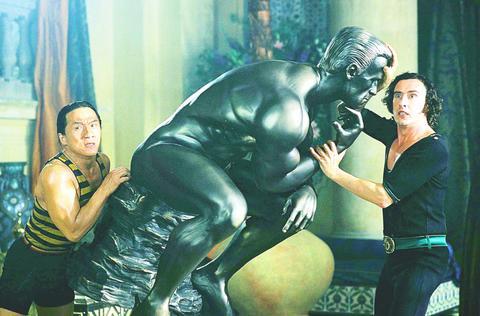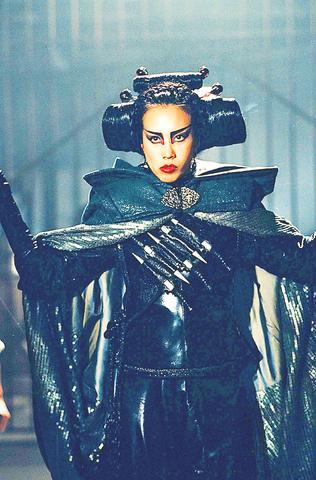There was little to make the 1956 movie version of Around the World in 80 Days a classic. It was essentially an excuse to showcase the (then new) widescreen format with nice landscapes and an all-star lineup (there were some 40 big-name cameo appearances).
As an extra bonus, it also showed just how easily Academy Award voters can be tricked into mistaking expensive gimmickry for art. It won best picture.
So this new, family-friendly adaptation of Jules Verne's novel can hardly be called a travesty. But it can't be called a very good movie, either.

PHOTO COURTESY OF FOX MOVIES
It's produced by a company, Walden Media, that wants to educate while entertaining the little ones without alienating mom and dad. The film just kind of rolls along without building up much narrative momentum. Not exactly boring, even clever and exciting in fits and starts, the new 80 still proves that, in the Spy Kids 21st century, Victorian-era fabulism plays just as old as it sounds.
The producers have tried to make the antique seem cool. Their efforts, to borrow a phrase from another literary source, are quixotic.
They've turned Passepartout, the French sidekick of globe-trotting English gent Phileas Fogg, into an acrobatic Chinese thief played by Jackie Chan (

PHOTO COURTESY OF FOX MOVIES
Chan, of course, has something of a child fan base, but that's mostly from TV cartoons (around the world, he's a much bigger movie star than he is here). How much of the pre-tween audience either of these guys are going to pack in is a pretty looming question mark.
Frank Coraci, who does Adam Sandler comedies, directs the movie, in which there are faint reflections of the earlier picture's cameo star galaxy. These range from the inexplicable, such as classy Oscar winners Jim Broadbent and Kathy Bates (well, she was in Coraci's Waterboy) to Rob Schneider (probably most kid-pleasing of the lot) to the sheerly loony last acting hoo-hah of California's current governor, Arnold Schwarzenegger as a vain and horny Turkish prince.
This makes the movie feel like a commercially calculated project built from faulty initial formulas. Those youngsters who do go will learn many, somewhat inaccurate things about the late 19th century: Who the Impressionists were; what the Wright brothers' most significant contribution to manned flight was; where the Statue of Liberty came from; and more -- if they're still awake.
Oh, dear, I'm not making it sound like very much fun, am I? Well, 80 is definitely more fun than school.
It's certainly not the greatest Jackie Chan movie ever, but the kung fu clown does deliver some fine slapstick while hanging from a hot air balloon and choreographs some clever martial arts mayhem in Paris, India, China and New York. Fogg's numerous inventions have a certain overbuilt, paleo-futuristic charm to them. And the film looks nice.
European locations were filmed in and around Berlin, Asian settings in Thailand. Too much obvious CGI is used to establish many long-since-changed locales.
The story this time involves Passepartout stealing a priceless jade Buddha from the British Museum. He only wants to return it to its rightful place in his home village but of course is considered a criminal. Fogg, meanwhile, makes the bet to circle the world with his strange new servant in order to win a post at the Royal Academy of Science. (Most members consider him a goofball.)
Pursued by British agents, Chinese assassins and sneaky saboteurs all the way, Fogg, Passepartout and feisty mademoiselle Monique (Belgian newcomer Cecile De France, pleasant and forgettable) bicker, betray and come to really appreciate one another.
But the new 80 never quite shakes the fatal sense of a good-for-you project, despite (bloodless) action, vulgar gags and ethnic stereotypes.
Overall, in this case, staying at home is a viable option.

May 11 to May 18 The original Taichung Railway Station was long thought to have been completely razed. Opening on May 15, 1905, the one-story wooden structure soon outgrew its purpose and was replaced in 1917 by a grandiose, Western-style station. During construction on the third-generation station in 2017, workers discovered the service pit for the original station’s locomotive depot. A year later, a small wooden building on site was determined by historians to be the first stationmaster’s office, built around 1908. With these findings, the Taichung Railway Station Cultural Park now boasts that it has

Wooden houses wedged between concrete, crumbling brick facades with roofs gaping to the sky, and tiled art deco buildings down narrow alleyways: Taichung Central District’s (中區) aging architecture reveals both the allure and reality of the old downtown. From Indigenous settlement to capital under Qing Dynasty rule through to Japanese colonization, Taichung’s Central District holds a long and layered history. The bygone beauty of its streets once earned it the nickname “Little Kyoto.” Since the late eighties, however, the shifting of economic and government centers westward signaled a gradual decline in the area’s evolving fortunes. With the regeneration of the once

The latest Formosa poll released at the end of last month shows confidence in President William Lai (賴清德) plunged 8.1 percent, while satisfaction with the Lai administration fared worse with a drop of 8.5 percent. Those lacking confidence in Lai jumped by 6 percent and dissatisfaction in his administration spiked up 6.7 percent. Confidence in Lai is still strong at 48.6 percent, compared to 43 percent lacking confidence — but this is his worst result overall since he took office. For the first time, dissatisfaction with his administration surpassed satisfaction, 47.3 to 47.1 percent. Though statistically a tie, for most

In February of this year the Taipei Times reported on the visit of Lienchiang County Commissioner Wang Chung-ming (王忠銘) of the Chinese Nationalist Party (KMT) and a delegation to a lantern festival in Fuzhou’s Mawei District in Fujian Province. “Today, Mawei and Matsu jointly marked the lantern festival,” Wang was quoted as saying, adding that both sides “being of one people,” is a cause for joy. Wang was passing around a common claim of officials of the People’s Republic of China (PRC) and the PRC’s allies and supporters in Taiwan — KMT and the Taiwan People’s Party — and elsewhere: Taiwan and